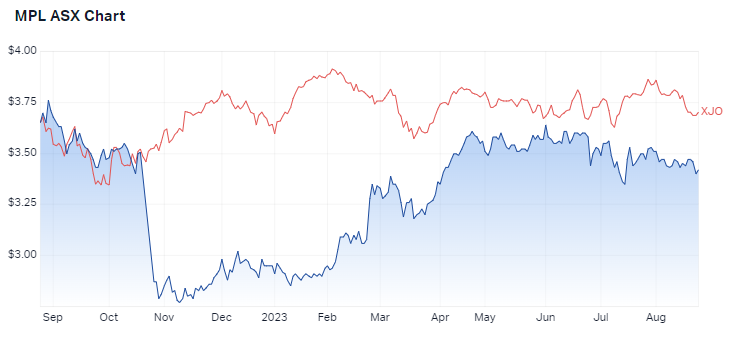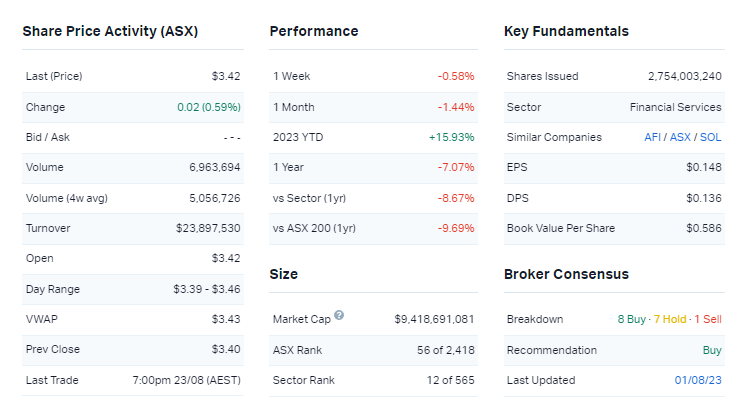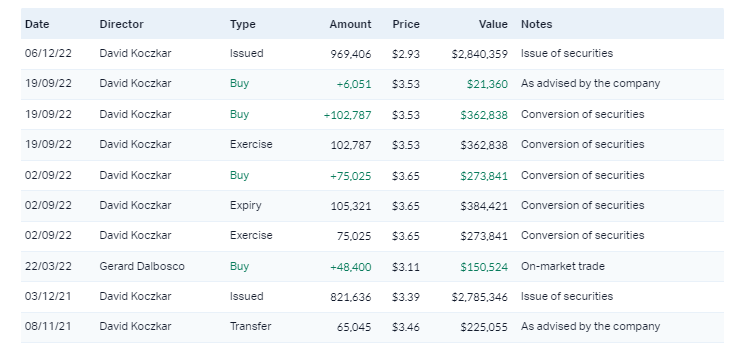Solid results, positive outlook, and policyholder growth - this insurer ticks all the boxes
We’re all experiencing cost pressures at the moment but perhaps nowhere more pronounced than via rising health insurance premiums.
There is mounting evidence that those with health insurance are switching to cheaper policies and, in some instances, abandoning health insurance altogether.
So, how does this auger for one of Australia’s leading health insurance companies, Medibank Private? - Quite well, it would seem, according to their latest numbers and the outlook from IML's Hugh Giddy.

Giddy points out the income generated by all of the insurers, not just Medibank, has been much stronger given higher rates, and he's not buying that there will be a mass exodus from private health insurance - unless we see unemployment tick up considerably.
It doesn't seem likely that a lot of that will happen because public wait times for surgeries continue to increase. There are tax disadvantages to not having health cover if you're above certain income thresholds. And, of course, there's the lifetime loading.
In this wire, Giddy unpacks MPL's latest results and outlook, and outlines his positive view on MPL, despite a more sobering outlook for the market in general.

Key numbers:
- Underlying NPAT A$499.6 million
- Revenue $7.36 billion
- Segment operating profit $694.6 million
- Final DPS 8.30c - Record 14-Sep, payable 5-Oct
Outlook:
- Medibank anticipates further moderation in resident industry growth in FY24 relative to FY23 and is aiming to achieve 1.5-2.0% resident policyholder growth in FY24.
- Targeting A$20M of productivity savings across FY24 and FY25.
- Expect costs of between A$30-35M in FY24 for further IT security uplift and legal and other costs related to regulatory investigations and litigation.
Key company data for MPL

MPL ranks in the top 10 categories for capital management (9) and value (9) as per the latest research from MarketMeter.
Note: This interview took place on Thursday 24 August 2023. MPL is a holding in the Investors Mutual Australian Share Fund.
In one sentence, what was the key takeaway from this result?
A good result driven by higher investment income.
Generally, a lot of companies are disappointing the market with their
guidance for higher interest costs. The effect of the Reserve Bank's rather
timid interest rate rises is obviously hurting most corporates, but the
insurers that have investment balances are benefiting from higher interest
rates. That's definitely the case with Medibank, but others like
Suncorp (ASX: SUN) and IAG (ASX: IAG) as well.
MPL was up 1% at the time of the interview. Was that move an overreaction, an under-reaction, or appropriate?
Rating: under-reaction
I think it's a fairly tempered reaction to a good result.
It's a good result, up 1%, not really a big rise. And I don't think it really ran hard into the result where the expectations were high. I think they've at least met or slightly exceeded expectations.
I know the consensus, depending on the analyst, is pointing to continuing extra IT costs, although the guide is lower than the $46 million of cyber incident costs. They're guiding $30-35m. So the drop in cost was because they took the $46 million above the line, but I think some people were expecting that to be a one-off.
I think it's a reality for all companies that cyber is a cost and actually, it's a competitive advantage for larger companies because they can more easily afford extra cyber costs.
Were there any major surprises in this result that you think investors should be aware of?
There were no major surprises, not really. None that stand out.
Overall, I didn't find a lot in the results that made me say, "Now maybe I've got to look in the small print". I don't see anything really bad, anything to concern me, rather very solid.
The outlook looks solid and better than the market overall.
Would you buy, hold or sell MPL on the back of these results?
Rating: BUY
I'd say it's a buy, based on the current earnings. It's just under 19 times.
It's a very solid business. It's not recession-proof, but it's quite steady.
They'll continue to get some higher investment income because we've had interest rate rises through the year. So they're cycling some lower interest rates. They're expecting continued policyholder growth. And one of the big moving factors is they have the overseas student business, students and workers who, because they're non-resident, they're not on Medicare. They're on visas, so they have to get a different type of health cover, and that is very profitable. It also benefits NIB, which is listed as well.
The yield is fully franked, 4.2% on a pre-tax basis. That's better than you can get in a term deposit, and it's a very solid defensive business.
What’s your outlook on MPL and its sector over the year ahead? Are there any risks to this company and its sector that investors should be aware of?
I think the main risk is around consumer belt-tightening if we do get a rise in unemployment.
We haven't had much of that to date, but the last employment report did show a little tick up in job losses.
If that continues and more people come under pressure as their mortgages become more expensive and as they run out of the excess savings that were built up in COVID, maybe they do things like downgrade or cut their health cover. However, I don't think it's a huge risk.
It doesn't seem likely that a lot of that will happen because public wait times for surgeries continue to increase. There are tax disadvantages to not having health cover if you're above certain income thresholds. And, of course, there's the lifetime loading. If you give up health cover when you're 35 and then take it up again when you're 40, it's going to cost you that much more. So if you can, it's one of those things that you would rather not give up. There are a lot more discretionary expenditures [that would be cut].
The brand seems to have recovered from the brand damage with cyber. So they could list cyber as one of the risks, but it's unlikely it will happen again.
I think the sector generally should be quite strong. I like Medibank over the sector because of their health business where they are focusing on two things that I like.
One, they're trying to focus on keeping their members healthy through their rewards program. Saying if you do steps or exercise, you get some credits. And I think that's what everyone should be doing. I mean the government in COVID, instead of saying stay at home, should have said, get out for a walk in the sunshine, build your immunity and build your health so that if you do get COVID, you won't get sick. That's a view. It's a sensible view, but I like that they're doing that.
I also like the fact that they are trying to keep people out of hospital for rehab. So if you have a joint replacement, instead of staying in hospital, having an expensive hospital bed, once you've had your joint replacement a physio or rehab specialist comes to your home. There's a big saving on that hospital stay, and Medibank provides that. And their policyholders don't think, "Oh, I've been kicked out of hospital or I had to go home." Most people want to be home. So it's a saving for Medibank and it's the thing that customers like, is to have their rehab at home.
From 1-5, where 1 is cheap and 5 is expensive, how much value are you seeing on the ASX right now? Are you excited or are you cautious on the market in general?
The market is not near the one, it's closer to the five - maybe four in terms of being expensive.
There's a lot of complacency about the economy, about a soft landing. The Reserve Bank has somehow engineered a drop in inflation, which we haven't really seen much of yet, but inflation is coming down a bit. It's quite high in services still. Wages are up a lot and electricity prices, insurance, there are a lot of things contributing to services inflation still.
Maybe the Reserve Bank's finished [hiking] but I don't think inflation is going down fast, and so far, because unemployment hasn't risen, people are thinking, "Oh well, we've still got growth and we've got rid of inflation, the best of all worlds." And that has led to a fairly high set of valuations for a lot of companies.
I still think that the cyclical companies are going to do fine because the economy's strong, but more economically sensitive companies, of which this is not really one - Medibank is a more defensive company - tend to be more expensive.
So I'm not so excited about the market in general, but I do feel that you can see value in companies like this, which are underappreciated relative to the market.
10 most recent director transactions

5 topics
3 stocks mentioned
1 fund mentioned
1 contributor mentioned


